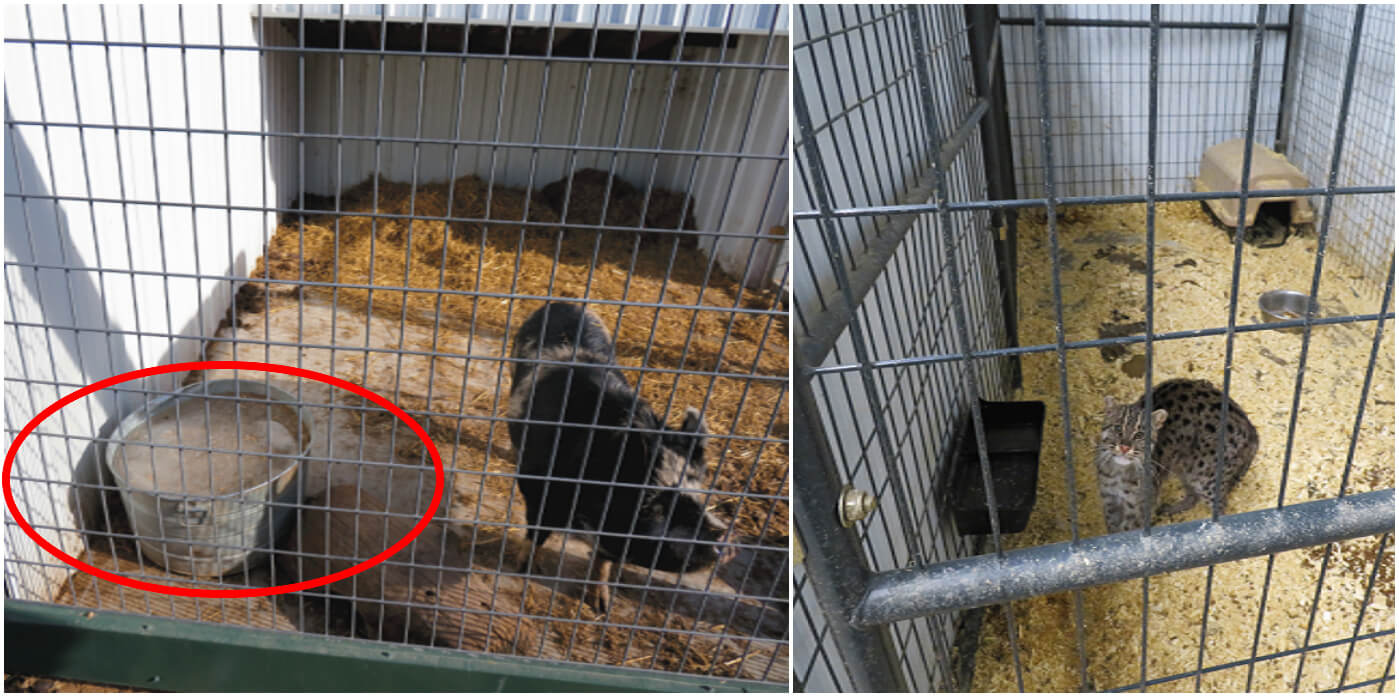How Michigan’s Even Keel Exotics Pushed Feds Past the Tipping Point
Even Keel Exotics was an exotic-animal dealer in Michigan that was owned and operated by Zachery Keeler until August 16, 2023, when his federal dealer’s license was revoked and the facility was closed. The following week, the U.S. Department of Agriculture (USDA) seized close to 150 animals from the facility. This is an extremely rare move by the agency, and PETA applauds it for stepping up and taking meaningful action.

Since 2015, the USDA cited Even Keel Exotics more than 75 times for failing to meet even the minimal care standards required by the federal Animal Welfare Act (AWA).
Hundreds of animals at Even Keel Exotics were confined to dismal and often unsanitary cages, and many structures were in a state of disrepair. Poor ventilation caused ammonia stenches described by USDA inspectors as “over-powering,” “eye-watering,” and “lung-stinging.”
Keeler repeatedly failed to provide adequate veterinary care to animals who had sustained injuries and had other health concerns, and inspectors found many animals who lacked access to clean drinking water at the facility.
Animals were reportedly loose from their enclosures during multiple USDA inspections, including a wallaby who was on the lam for two days. A child was bitten by a coatimundi in 2018, and another one was bitten by a fox in 2021.
After racking up dozens of citations, Keeler began denying USDA inspectors access to his facility.
Following a USDA inspection in May 2022, he refused federal inspectors access to his facility eight consecutive times over the course of a year.
On July 18, 2023, the USDA filed an administrative complaint focused on the 33 most recent alleged AWA violations at Even Keel Exotics.
Two days later, the U.S. Department of Justice (DOJ) filed a civil lawsuit alleging violations of the AWA and the Endangered Species Act (ESA) at the facility.
The DOJ noted that “Mr. Keeler’s repeated attempts to avoid federal inspection and oversight have resulted in needless and substantial harm to the animals in his care.”
The DOJ’s case revealed information that had not previously been available to the public, including that the USDA was finally granted access to Even Keel Exotics on June 29, 2023, when inspectors apparently cited Keeler for 20 violations of the AWA. Problems at the facility included the following:
- A capybara had been subjected to rough handling, as seen in news footage that PETA reported to the USDA.
- One nursing cat was so thin that her hipbones were prominently visible. She—along with her kittens—had no food or potable water. When inspectors instructed Keeler to provide them with food, the kittens ate for at least four minutes.
- Another enclosure containing a mother cat and her kittens had no drinkable water. When Keeler provided them with water, the mother cat drank for over three and a half minutes.
The DOJ also alleged violations of the ESA due to the facility prematurely separating a 2-month-old endangered ring-tailed lemur from their mother so the animal could be used in hands-on encounters with humans.
Lemurs naturally spend over two years by their mother’s side, and public handling can distress primates as well as expose vulnerable infants to potentially infectious diseases.
According to the DOJ, the USDA issued a notice of a 21-day suspension of Keeler’s license on the same day as the July 18, 2023, administrative complaint, meaning that he was prohibited from exhibiting animals during a planned event at Even Keel Exotics on July 22, 2023, in which members of the public were going to be allowed to interact with animals—including the endangered infant lemur.
Keeler entered into a consent decree with the DOJ on August 15, 2023, agreeing never to engage in any AWA-regulated activity or apply for another AWA license in the future.
He also agreed never to possess ring-tailed lemurs.
The USDA permanently revoked Keeler’s AWA license a day after the DOJ’s consent decree was entered.
In total, Keeler agreed to allow the USDA to confiscate 142 animals from Even Keel Exotics, including the following:
- 60 ground squirrels
- 50 black-tailed prairie dogs
- 7 ring-tailed lemurs
- 6 striped skunks
- 5 fennec foxes
- 4 Bennett’s wallabies
- 3 kinkajous
- 2 prehensile-tailed porcupines
- 2 red foxes
- 1 African crested porcupine
- 1 fishing cat
- 1 serval
Social media posts reveal that at least two other cats—caracals—formerly held at Even Keel Exotics have also been taken elsewhere. Four animals formerly held at the Michigan facility are now at The Wildcat Sanctuary in Minnesota, a reputable sanctuary accredited by the Global Federation of Animal Sanctuaries.
Help Animals in Roadside Zoos
Many unaccredited zoos and roadside menageries have long histories of harming animals. Bears, big cats, and others in these tourist traps face many hardships, including often being denied proper veterinary care, clean and safe enclosures, and even adequate shelter from wind and extreme temperatures. Never visit roadside zoos—and encourage your family, friends, coworkers, and social media followers to avoid them as well.

